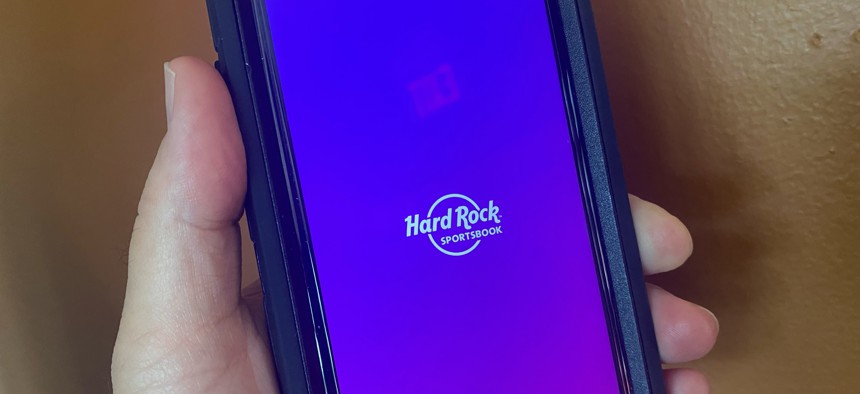Bets off: Don't expect to be able to wager online in Florida anytime soon
Florida could be a 'sports-betting beast,' one expert says, but it could be a while before apps turn back on

The opportunity to tap a screen on a mobile device to place a wager on horse races, NCAA playoffs or the Super Bowl faces a number of hurdles in Florida. Jim Rosica
For a hot minute, Floridians could download an app on their cell phones and place bets on pro sports games, tennis matches and NASCAR races from anywhere in the state.
Mobile wagering on sports events lasted just over a month, however, and the fate of sports betting in the Sunshine State – potentially one of the most lucrative markets in the nation – remains in limbo. The odds are that sports betting in the third largest state in the country won’t kick off again for at least two or three years.
But Florida has something in its corner that can’t be matched elsewhere: size.
“Sports betting is a pretty simple product. The bigger the market, the bigger the (betting) market is going to be,” Chris Grove, partner emeritus with the California-based Eilers & Krejcik Gaming practice, told City & State in a phone interview while attending a gambling conference in Las Vegas.
The checklist for states where sports betting has the greatest potential includes employment rates, “higher levels of fandom” for sports teams, and population density, Grove said. Florida ticks the boxes on all three factors.
“But really, when you’re talking about the U.S., the single biggest determiner of how productive a given market is going to be is how many people live there,” Grove said. With a population of more than 21 million residents and an estimated 120 million visitors each year, Florida is viewed as the motherlode for sports betting.
And while size matters, the Sunshine State also has attributes that can’t be matched in places where sports betting is already a major tourism draw, such as New Jersey and Wyoming. “The year-round warm weather coupled with hundreds of miles of beaches is the differentiator which places Florida in a unique position among any state,” Daniel Wallach, a Hallandale Beach-based lawyer who specializes in sports betting, said in a recent interview.
Florida’s four core components – population size, tourism, warm weather and beaches – make it a “sports-betting beast,” according to Wallach. But the opportunity to tap a screen on a mobile device to place a wager on horse races, NCAA playoffs or the Super Bowl faces a number of hurdles in Florida.
Plenty of hitches confound sports betting’s return
They include the powerful Seminole Tribe of Florida, currently the sole operator of Las Vegas-style casino gambling in the state. There’s also the Florida Constitution, which requires statewide approval for an expansion of gambling. And, perhaps the biggest factor, money. Loads of it.
Attempts to spark sports betting in Florida flailed on two fronts over the past year, despite the promise of billions of dollars in revenue and tens of millions of dollars spent on a ballot initiative. One involved the Seminoles and the other was a failed attempt to place a constitutional amendment before voters in November. The measure would have legalized sports betting throughout the state.
The state’s brief dalliance with sports betting late last year was part of a 30-year, $2.5 billion gambling deal inked by Gov. Ron DeSantis and Seminole Tribe of Florida Chairman Marcellus Osceola, Jr. The agreement, known as a compact, gave the Seminoles control of sports betting throughout Florida, using a “hub-and-spoke” system designed to allow gamblers throughout the state to place bets run through computer servers on tribal property.
Owners of Magic City Casino in Miami-Dade County and Bonita Springs Poker Room in Southwest Florida challenged the compact in federal lawsuits, arguing that the sports-betting set-up violates federal law and that it would have a “significant and potentially devastating” impact on their business. The Havenick family has owned the two pari-mutuels for decades.
In November, Washington, D.C.-based U.S. District Judge Dabney Friedrich struck down the compact, saying it violated the federal Indian Gaming Regulatory Act, or IGRA, which sets up a framework for gambling on tribal lands. Friedrich’s ruling prompted the Seminoles to suspend their Hard Rock SportsBook mobile app just weeks after its November launch.
The Seminoles and the U.S. Department of the Interior, which oversees tribal gambling, have appealed Friedrich’s decision and the app remains offline while the appeals proceed. Amid legal wrangling over the compact, online gaming behemoths DraftKings and FanDuel collectively pumped more than $37.2 million into a committee behind a proposed constitutional amendment that would authorize sports betting at professional sports venues, pari-mutuel facilities and statewide via online platforms.
If betting revenues were taxed, the tax dollars would have to be steered toward public education. But Florida Education Champions, the committee sponsoring the proposal, fell far short of submitting roughly 900,000 signatures by a Feb. 1 deadline to make it onto the November ballot.
Supporters, who launched the sports-betting initiative less than nine months before the February deadline, in part blamed last year’s outbreak of the highly contagious omicron coronavirus variant for missing the mark. It’s unclear whether backers of the sports-betting plan will launch another effort for the 2024 ballot. Under state law, petition signatures are only valid for one election cycle, meaning the group would have to start from scratch.
In March, Southwest Florida Enterprises, Inc., a company headed by the Havenick family, contributed $4 million to the committee. When asked for comment on the group’s plans for 2024, Florida Education Champions spokeswoman Christina Johnson pointed to a statement the committee released in January: “We will be considering all options in the months ahead to ensure that Floridians have the opportunity to bring safe and legal sports betting to the state, along with hundreds of millions of dollars annually to support public education.”
Getting gambling before state voters won’t be easy
But Nick Iarossi, a lobbyist whose clients include Las Vegas Sands Corp. and Florida pari-mutuel operators, warned that getting a sports-betting initiative on the ballot and passing it, which requires approval from at least 60 percent of voters, won’t be easy.
“Any entity that wants to pass a gaming referendum for 2024 needs to start now to ensure they have an adequate runway to get the necessary signatures in what will be a protracted fight with the tribe and be prepared to spend in excess of $100 million between signature gathering and the advocacy necessary to pass the referendum,” Iarossi said in a recent interview.
Las Vegas Sands pumped at least $73 million into a separate gambling-related proposal that also stumbled this year. That measure would have opened the door to Las Vegas-style casino games at existing pari-mutuels in North Florida. The initiative’s sponsors narrowly missed the signature requirement for placement on the 2022 ballot.
As the February deadline approached, Sands and the Seminoles were embroiled in public relations and legal controversies about nefarious tactics alleged by both sides in the signature-gathering process. Accusations included allegations that the Seminoles were illegally trying to “buy off” workers for the Sands-backed effort, falsification of petitions, and death threats to workers on both sides.
The Seminoles also helped to block the sports-betting proposal, which would have taken away the tribe’s exclusive control of the gambling activity if voters had approved the measure. The deal with the Seminoles would have netted the state at least $2.5 billion over five years.
But opening up sports betting to other operators could be a cash cow for Florida, according to some estimates.
“If it’s convenient access, meaning statewide mobile and it’s available at enough retail locations, potentially including professional sports venues, Florida should become a $2 billion-a-month betting-transaction state,” Wallach predicted. “It all depends on how widely available and how convenient it is.”
Although mobile sports betting would bring the biggest revenues to the state and participating operators, Florida could also adopt a more limited option through a new compact with the Seminoles. The deal could give the tribe the ability to offer a sportsbook at its Florida casinos.
But it would be a challenge for such a proposal, which would face opposition from the state’s pari-mutuel operators, to garner enough votes for passage by the Florida Legislature, whose blessing is required for any compact with the Seminoles. Sports betting doesn’t have to involve the Seminoles, but the Legislature’s ability to advance a sports-betting proposal is limited.
A 2018 Florida constitutional amendment, known as Amendment 3, required voter approval of gambling expansions in the state. Supporters of the amendment maintain that sports betting that takes place off tribal lands requires voter authorization. John Sowinski, president of the group No Casinos that backed the amendment, said Florida is better off taking a wait-and-see approach to sports betting.
“We’ve been well served throughout our history in hitting the pause button while other states hit the play button,” he said.
Dara Kam is a reporter with the News Service of Florida.
